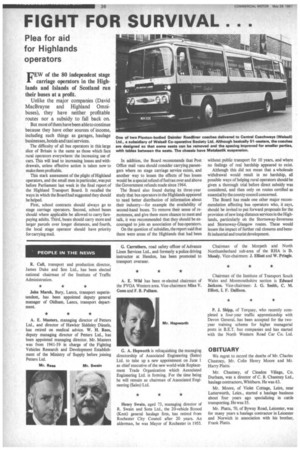FIGHT FOR SURVIVAL.. .
Page 38

If you've noticed an error in this article please click here to report it so we can fix it.
Plea for aid for Highlands operators
VIEW of the 80 independent stage carriage operators in the Highlands and Islands of Scotland run their buses at a profit.
Unlike the major companies (David MacBrayne and Highland Omni buses), they have neither profitable routes nor a subsidy to fall back on.
But most of them have been ableto continue because they have other sources of income, including such things as garages, haulage businesses, hotels and taxi services.
The difficulty of all bus operators in this large slice of Britain is the same as those which face rural operators everywhere: the increasing use of cars. This will lead to increasing losses and withdrawals, unless effective action is taken now to make them profitable.
This stark assessment of the plight of Highland operators, and the small men in particular, was put before Parliament last week in the final report of the Highland Transport Board. It recalled the ways in which the Board had suggested they should be helped.
First, school contracts should always go to stage carriage operators. Second, school buses should where applicable be allowed to carry farepaying adtilts. Third, buses should carry more and larger parcels over longer distances, and fourth, the local stage operator should have priority for carrying mail. In addition, the Board recommends that Post Office mail vans should consider carrying passengers where no stage carriage service exists, and another way to lessen the effects of bus losses would be a special refold of fuel tax over and above the Government refunds made since 1964.
The Board also found during its three-year study that bus operators in the Highlands appeared to need better distribution of information about their industry—for example the availability of second-hand buses. To remove their sense of remoteness, and give them more chance to meet and talk, it was recommended that they should be encouraged to join an association of bus operators.
On the question of subsidies, the report said that there were areas of the Highlands that had been without public transport for 10 years, and where no feelings of real hardship appeared to exist.
Although this did not mean that a wholesale withdrawal would result in no hardship, all possible ways of helping rural operators should be given a thorough trial before direct subsidy was considered, and then only on routes certified as essential by the county council concerned.
The Board has made one other major recommendation affecting bus operators who, it says, should be invited to put forward proposals for the provision of new long-distance services in the Highlands, particularly on the Stornoway-Inverness and Stornoway-Glasgow routes. These would lessen the impact of further rail closures and benefit industrial and tourist development.












































































































